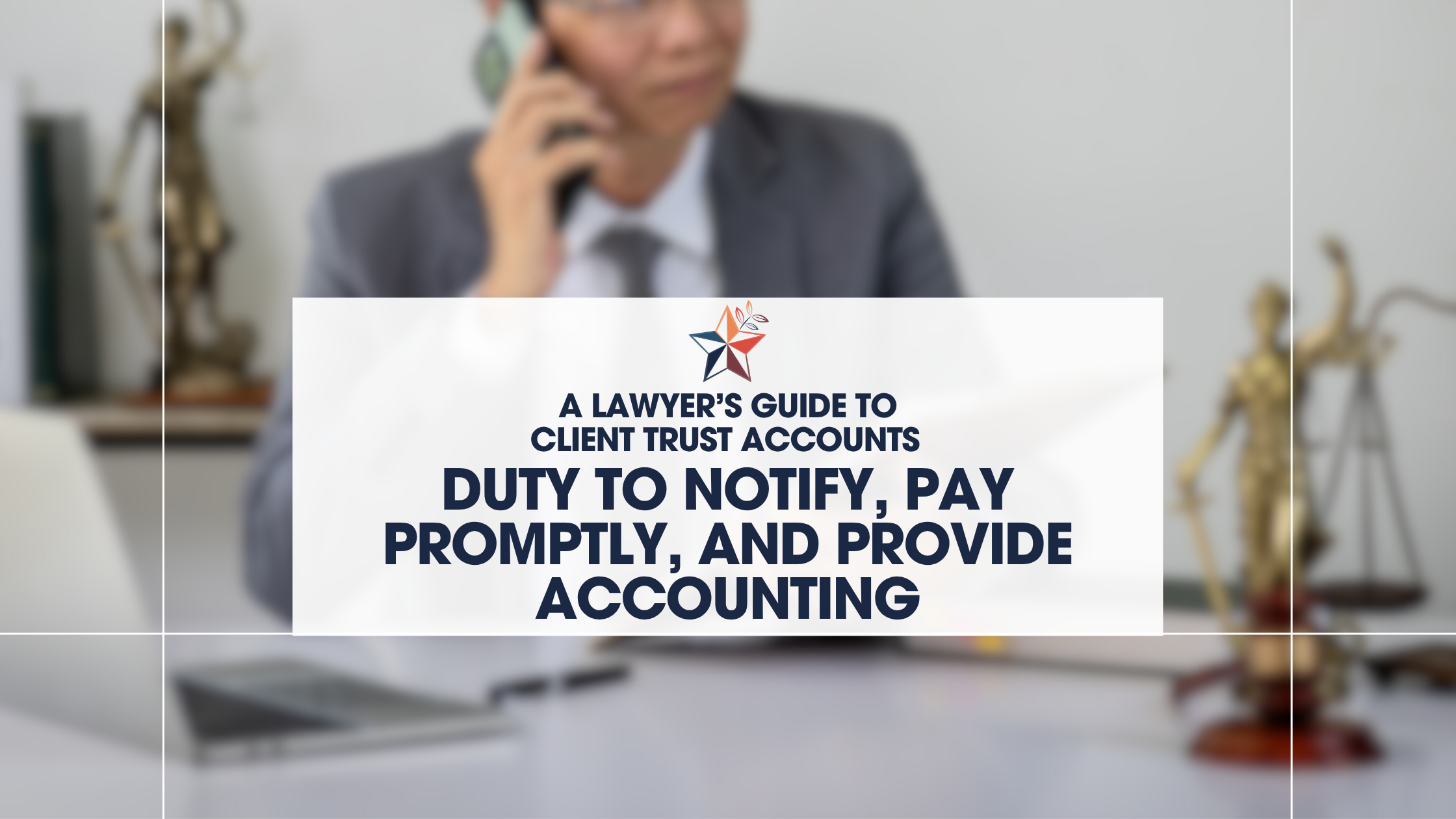Duty to Notify, Pay Promptly, and Provide Accounting | Guide to Client Trust Accounts
Published on February 20, 2024 Starting a Practice Maintaining a Practice Growing a Practice

When a lawyer receives funds that belong to another, Rule 1.14 requires the lawyer to promptly notify that person and deliver the funds.[1] The rule does not define promptly, so a reasonableness standard should be used.
Rule 1.15 requires that the lawyer promptly deliver to the client or third person any funds or other property that the client or third person is entitled to receive.[2] Third persons often claim a legal interest in the funds, such as an assignment or lien.[3] Who is entitled to receive funds is a question of law, not governed by the Texas Disciplinary Rules of Professional Conduct. Lawyers should also be familiar with their duties under fiduciary law and other law that may relate to funds held.[4]
Likewise, lawyers sometimes face confusion when the client terminates the relationship before completion of a matter, with or without good cause. Is the lawyer entitled to receive fees from funds protected by Rule 1.14? Do they recover under their contract? Can they recover under quantum merit? These, too, are questions of substantive law, not determined by disciplinary rules or ethics opinions.[5]
When a lawyer receives funds that belong to another, Rule 1.14 requires the lawyer, if requested, to render a full accounting of property.[6]
Unclaimed Funds
Occasionally, a lawyer’s trust account may include unclaimed funds because the person to whom the funds belong cannot be located. The lawyer should make all reasonable efforts to locate the person as directed by the Texas Property Code[7] so that proper payment under this rule can be made, including attempting to contact the person at last known addresses and telephone numbers.
If the person cannot be located after all reasonable efforts have been exhausted, the lawyer should keep the funds in the trust account for at least three years.[8] Afterwards, a lawyer can treat the property as abandoned and follow the abandoned property provisions in the Texas Property Code on how to handle these funds.[9] Effective September 1, 2023, any unclaimed or abandoned IOLTA funds that have been delivered to the Comptroller will be deposited into the basic civil legal services account of the judicial fund for use by programs approved by the Supreme Court of Texas to provide civil legal services to indigent people.
It is important to remember that a lawyer must maintain trust account records on these funds for a period of five years after termination of the representation even if the funds are treated as abandoned property under the Texas Property Code.[10]
(See Appendix 7 for Ethics Opinion 602.)
[1] Tex. Disciplinary R. Prof’l Conduct 1.14 (b). See also Onwuteaka, at 4.
[2] Tex. Disciplinary R. Prof’l Conduct 1.14 (b). See Wilson v. Comm’n for Lawyer Discipline, BODA Case No. 46432 (January 28, 2011) (available at: www.txboda.org/cases/joe-marr-wilson-v-commn-lawyer-discipline); McIntyre v. Comm’n for Lawyer Discipline, 247 S.W.3d 434, 441-43 (Tex. App.—Dallas 2008, pet. denied). See also Kaufman, 197 S.W.3d at 876-77; Bellino, 124 S.W.3d at 388; Tex. Comm. on Prof’l Ethics, Op. 580, 71 Tex. B.J. 586 (2008); Tex. Comm. on Prof’l Ethics, Op. 681, 81 Tex. B.J. 800-02 (2018).
[3] Tex. Comm. on Prof’l Ethics, Op. 625, 76 Tex. B.J. 362 (2013); Tex. Comm. on Prof’l Ethics, Op. 681, 81 Tex. B.J. 800-02 (2018).
[4] See for example Tex. Gov’t Code § 82.063.
[5] See for example Hoover Slovacek L.L.P. v. Walton, 206 S.W.3d 557 (Tex. 2006); Mandell & Wright v. Thomas, 441 S.W.2d 841 (Tex. 1969). See also Auguston v. Linea Aerea Nacional-Chile, S.A., 76 F.3d 658 (5th Cir. 1996); Royden v. Ardoin, 331 S.W.2d 206 (Tex. 1960).
[6] Tex. Disciplinary R. Prof’l Conduct 1.14 (b). See Wade v. Comm’n for Lawyer Discipline, 961 S.W.2d 366, 375 (Tex. App.—Houston [1st Dist.] 1997, no pet.). See also Tex. Disciplinary R. Prof’l Conduct 1.04 (d); Kaufman, 197 S.W.3d at 877; Bellino, 124 S.W.3d at 387.
[7] See generally Tex. Prop. Code chs. 72-74.
[8] Tex. Comm. on Prof’l Ethics, Op. 602, 73 Tex. B.J. 976-77 (2010); Tex. Prop. Code chs. 72 and 74.
[9] See id.
[10] Tex. Disciplinary R. Prof’l Conduct 1.14 (a).
-1.png)
Law Practice Management Committee
The Law Practice Management committee is comprised of experienced lawyers from across Texas who have been appointed by the State Bar President.